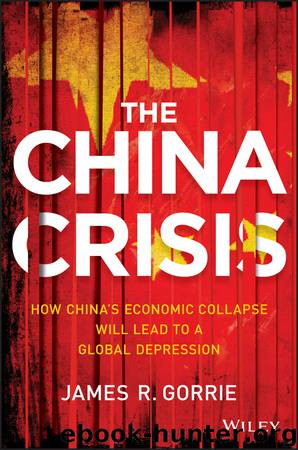The China Crisis by James R. Gorrie

Author:James R. Gorrie
Language: eng
Format: epub
Publisher: Wiley
Published: 2013-03-24T16:00:00+00:00
China’s Quality of GDP
A big part of the picture in China’s claims of economic strength is its GDP growth rate. However, a big part to the puzzle of China’s impressive GDP statistics is the quality of its GDP. That is, what kind of economic activity in China is included in its GDP calculations?
Prior references in this book have pointed out China’s false advertising regarding the strength of its economy and its GDP statistics over the years. We have also noted how China’s claim of double-digit annual GDP growth doesn’t jibe with flat or minimally increased electricity use; or as observed earlier, that China’s GDP numbers are for reference only. These are all very valid points of concern and tell us that a closer look at China’s economic activity will likely reveal many strands of weakness in the country’s economic fabric.
It truly cannot be overstated that the pervasive culture of corruption, fraud, and graft throughout every aspect of China’s economy and society creates enormous difficulties in accuracy regarding the country’s growth or other national aspects. Behavior by those in authority as well as the Chinese public at large is a much more reliable indicator of reality than falsified official statistics. Behavior is the lens through which a certain clarity regarding the health of both China’s economy and its society is most clearly viewed. And the view is a disturbing one.
Hu Jintao, China’s most recent leader, said as much in his warning to the new leaders in his 2012 state-of-the-nation address to Party members:
In a state-of-the-nation address to more than 2,000 hand-picked party delegates before he hands over power, Hu acknowledged that public anger over graft and issues like environmental degradation had undermined the party’s support and led to surging numbers of protests.
“Combating corruption and promoting political integrity, which is a major political issue of great concern to the people, is a clear-cut and long-term political commitment of the party.
“If we fail to handle this issue well, it could prove fatal to the party, and even cause the collapse of the party and the fall of the state. We must thus make unremitting efforts to combat corruption.”4
Hu’s warning to his fellow party members to “combat corruption and promote political integrity” goes to the heart of China’s economic system, which operates along political axes, not from a demand-based context or a profit/market axis. Its state-directed economic activities like reckless lending, inflated profit claims, false revenues, construction projects like entire cities that remain unoccupied, and other stimulus-related economic activity that has little to do with actual demand or purpose in the economy is counted in GDP at some level. There is—or ought to be—great doubt as to what level of real value those activities inject into the economy. State-mandated activity, from lending to labor, may lead to a new construction project, but will the project add value to the economy past its construction period? Is it really productive and adding to GDP? Is there a verifiable return on capital? And is the reported economic
Download
This site does not store any files on its server. We only index and link to content provided by other sites. Please contact the content providers to delete copyright contents if any and email us, we'll remove relevant links or contents immediately.
International Integration of the Brazilian Economy by Elias C. Grivoyannis(107829)
The Radium Girls by Kate Moore(12012)
Turbulence by E. J. Noyes(8014)
Nudge - Improving Decisions about Health, Wealth, and Happiness by Thaler Sunstein(7689)
The Black Swan by Nassim Nicholas Taleb(7097)
Rich Dad Poor Dad by Robert T. Kiyosaki(6595)
Pioneering Portfolio Management by David F. Swensen(6280)
Man-made Catastrophes and Risk Information Concealment by Dmitry Chernov & Didier Sornette(6001)
Zero to One by Peter Thiel(5782)
Secrecy World by Jake Bernstein(4736)
Millionaire: The Philanderer, Gambler, and Duelist Who Invented Modern Finance by Janet Gleeson(4457)
The Age of Surveillance Capitalism by Shoshana Zuboff(4272)
Skin in the Game by Nassim Nicholas Taleb(4232)
The Money Culture by Michael Lewis(4186)
Bullshit Jobs by David Graeber(4177)
Skin in the Game: Hidden Asymmetries in Daily Life by Nassim Nicholas Taleb(3986)
The Dhandho Investor by Mohnish Pabrai(3750)
The Wisdom of Finance by Mihir Desai(3726)
Blockchain Basics by Daniel Drescher(3571)
